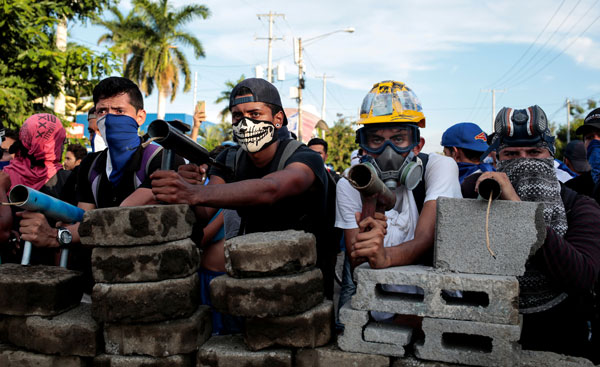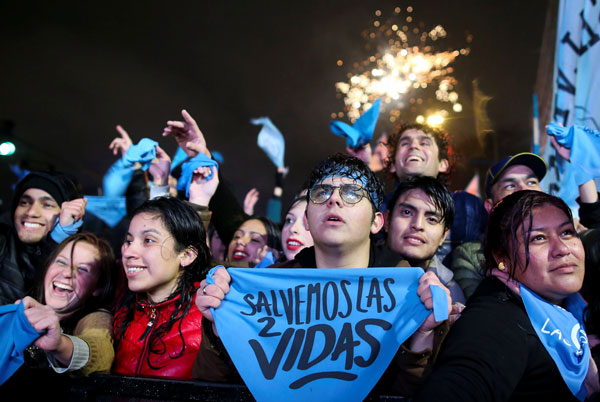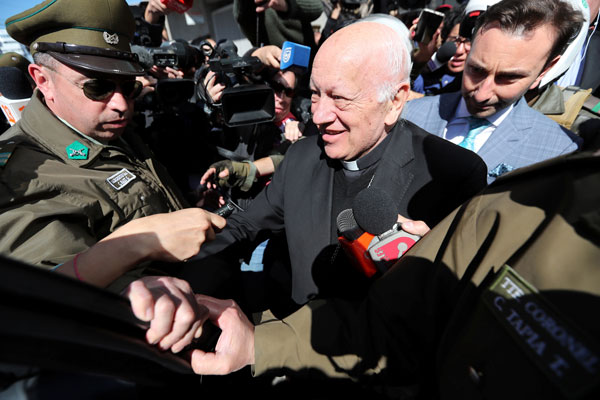By Inés San Martín
Crux — Due to its influence and presence, representing 40 percent of the global Catholic population, there’s a tendency for a disproportionate share of Catholic stories to come from Latin America, the home of history’s first pope from the global south, Francis.
2018 was no exception, with major Catholic stories, or major local events where the Church played a key role coming from everywhere in the region. At the risk of being unfair to the ones left out, there were four key events coming from the region.
Nicaragua and Venezuela: A Deeply Rooted Crisis

The situation in both countries is both distinct and similar: a deeply rooted crisis, hundreds of thousands going out to the streets to protest Russia-backed governments, and the Catholic hierarchy becoming a leading voice for those opposing presidents Nicolas Maduro and Daniel Ortega, who have been labeled as “dictators” by many in the international community.
Both crises have been simmering for a while, though 2018 saw in both Venezuela and Nicaragua the explosion of a society that said “basta.”
In the case of the nation led by Maduro, re-elected through questioned elections for a presidency that will begin in the new year, the core of the civil protests took place in 2017, with the past 12 months seeing a population that is too tired- and hungry- to revolt, and is instead focused on fleeing to neighboring countries.
This led to hundreds of thousands of Venezuelans arriving in Argentina, Chile, Brazil and other nations, that have in turn begun discussing tougher border policies.
In Nicaragua, protests erupted in April, after the government announced changes to social security that would have impacted the elderly and low-income workers. Hundreds of thousands took the streets in Managua, Leon, Granada and other major cities, and national roads were cut off by barricades set up by protesters, the police, the army and paramilitary forces.
An estimated 500 people died in the protests, a majority students, and several of them infants. Catholic churches opened their doors to function as hospitals after the government banned public health centers from treating the wounded.
Some 30,000 Nicaraguans have fled to Costa Rica alone, and some hundreds are currently being held in prison for participating in the protests, and an unknown number of people, also in the hundreds, have “disappeared,” taken from their homes or the streets never to be seen again.
In both nations Catholics represent the majority of the population, and the civic unrest saw them in hordes protesting what they see as corrupt government forces. In the case of Nicaragua, where Crux spent two weeks in November, many accuse Ortega of becoming a Somoza, the dictatorial dynasty that ruled the Central American country for over six decades and which Ortega helped overturn.
Bishops traveled to Rome using various opportunities to try to address the crisis and make sure Pope Francis is up-to-date on the events shaking the region. In turn, the pontiff has publicly voiced his concern for Nicaragua and Venezuela at least half a dozen times in the past year, and many more times in private.
In the case of Venezuela, sources with knowledge of the situation have told Crux that when the bishops were in Rome last September for their ad limina visit, the matter of the Holy See acknowledging Maduro as the rightful, democratically elected president was brought up by many in the Vatican, including Francis.
The situation is a complex one, and no clear decision was reached during the week-long visit. Cardinal Pietro Parolin, the Vatican’s Secretary of State, was the papal representative in Venezuela before being chosen by Francis for his current job back in 2013, so he knows Maduro well, and that the successor of Hugo Chavez will have no qualms about openly declaring a war on the Catholic Church.
Though the bishops have been clear in the past year of their opposition to the government, several Venezuelan expats consulted by Crux acknowledge they wish the hierarchy would do more. However, they also acknowledge that this could put at risk the activities of the Catholic aid agency Caritas, one of the very few still allowed to run soup kitchens and first aid care in a country where things such as food and medical supplies are scarce.

Argentina: An (Un)expected Civic Revolt
On March 1, President Mauricio Macri announced he was going to allow the senate to debate a bill to legalize abortion. He surprised both friends and foes, as he had openly stated that he was against abortion and not interested in such a bill.
It had been 12 years since a president had given a green light for a bill to even reach the floor, and when the bill failed to be approved in the Senate, the country was left even more divided than it had been before the months-long debate.
Hundreds of thousands from both camps took to the streets, with the pro-choice activists, represented by the color green, dying the streets of Buenos Aires, while the pro-lifers, represented with light blue handkerchiefs mobilizing not only in the capital, but in every major city of the interior, reminding those who govern from Pope Francis’s former city that Argentina is a Federal nation.
The pontiff decided to stay out of the debate, as he’s done in Italy whenever gay marriage is debated, beyond a few key-placed comments, such as saying that a group of high school students had better proposals than the Argentine senate.
The bishops were a bit more direct in their approach, releasing several statements, strong homilies calling for the protection of both lives, that of the mother and the unborn child, convoking to days of ecumenical prayer and participating in the rallies, but never quite organizing them.
Instead, they urged lay experts to take the lead, participating in televised debates and in a series of sessions organized by the Argentine congress to hear both sides of the argument. Only one bishop and a priest were among the hundreds to speak during these days, both of whom live and work in the slums of Buenos Aires, so no one accused them of not working with the poor.
In Argentina abortion is illegal, unless the life of the mother is at risk, the viability of the baby’s life outside the womb is improbable or if the pregnancy was the result of abuse. Had the bill been approved, abortion would have been “legal, safe and free” until week 14 of the pregnancy and basically until birth under the three afore-mentioned circumstances. The concept of the life of the mother being at risk would have been widened to include “physical, psychological and social” risk of the mother, such as a woman splitting up with her partner weeks before the baby was due.
In addition, a 16-year old would have been able to get an abortion without the consent of an adult, even though she’s considered a minor under Argentine law.
Chile: Crisis From Within

Francis’ belated response to the crisis in Chile was partially examined here. However, too much happened in the local Catholic Church in 2018 to reduce it to the Vatican’s response. It’s been six months since every Chilean bishop presented his resignation to Francis after the successor of St. Peter flat-out accused some of them, without giving names, of covering up sexual abuse as well as abuses of conscience and power, and of destroying evidence.
Technically speaking, under code 189 of the Church’s legal compendium, the pope had three months to accept those resignations, otherwise they became meaningless.
The Code of Canon Law is very clear: “A resignation which requires acceptance lacks all force if it is not accepted within three months; one which does not require acceptance takes effect when it has been communicated by the one resigning according to the norm of law.”
In total, 33 Chilean bishops are believed to have signed a paper placing their pastoral mission in the hands of Francis when they were in Rome, a vocabulary they used at a press conference before leaving the Eternal City.
Since then, the Argentine pontiff has accepted seven resignations, and he’s expected to accept others, including that of Cardinal Ricardo Ezzati, Archbishop of Santiago, who’s been summoned by the prosecutor’s office to give witness on cover-up charges.
In addition, Ezzati was born in Campiglia dei Beici, Italy. In 2006, Chilean law 20.100 granted him citizenship as a recognition for the “fruitful and valuable work” he’d done for the country, but today there’s a petition for him to lose that recognition.
Given the passage of time, several Chilean bishops who felt the sword of Damocles gravitating over their heads are now taking deep breaths, assuming they’ve been cleared.
Yet several sources told Crux that the May resignations quoted no canon, meaning it was “pastoral” in tone, and despite what some bishops are beginning to say sotto voce, they are not off the hook yet.
To make this point, it’s worth noting that some of the resignations delivered in May were accepted after the alleged “expiration date” on Sept. 21.
Those two bishops were Cristian Contreras of San Felipe and Carlos Pellegrin. Both are currently being investigated by a Chilean prosecutor’s office not only for cover-up but of sexually abusing minors themselves.
Sources from within the Chilean Church have told Crux some of the bishops are currently contemplating coming back to Rome to talk to the pope, as they believe Francis has been “unfair” and excessively harsh with the Chilean hierarchy.
Others, priests and laity, are instead beginning to lose their patience at the slow rhythm of the reform, because they want to see more heads roll, including that of Ezzati.
Many had speculated that the departure could happen before Christmas, though a source with knowledge of the situation told Crux that even though there’s a potential candidate, he doesn’t think the issue will be resolved that soon, because whoever takes over Santiago will have to carry a heavy load.
It’s still unclear what the long-term vision Francis has for the church in Chile is, but as one source put it talking about the loss of credibility the institution has experienced locally, “you can’t fix in months what took decades to destroy.”
